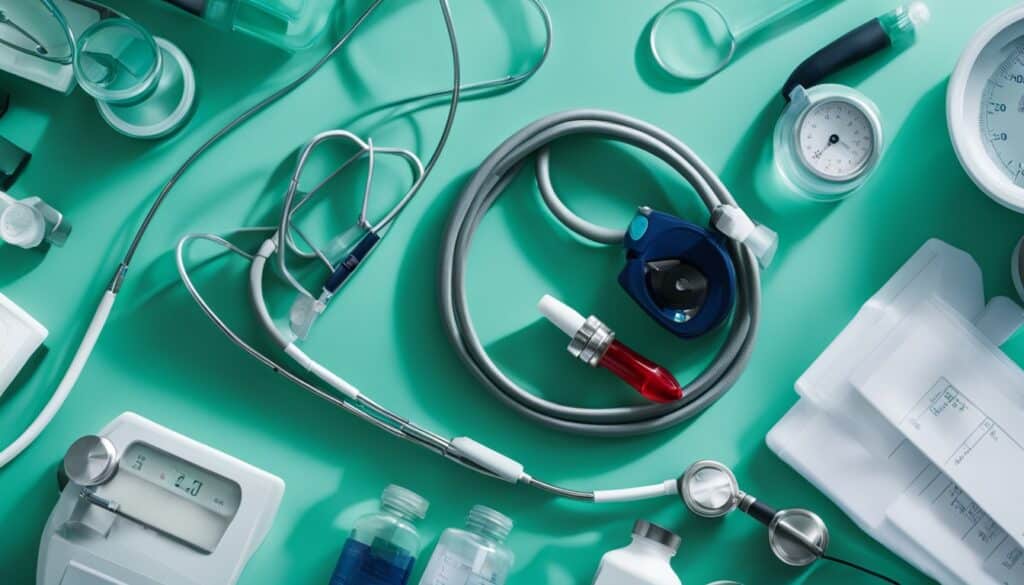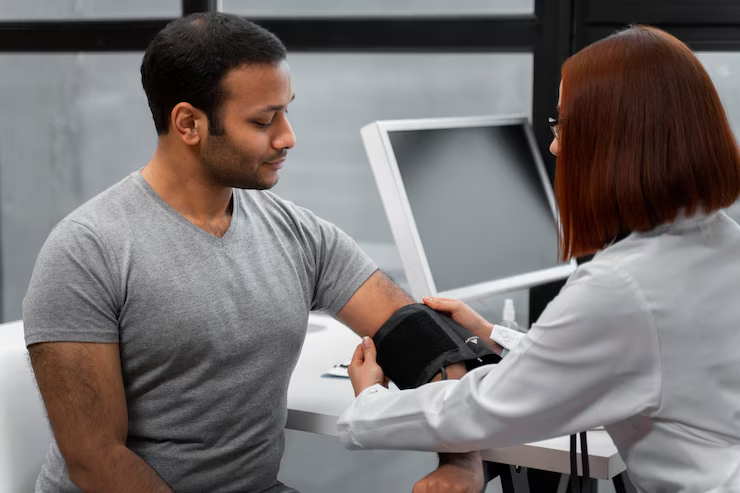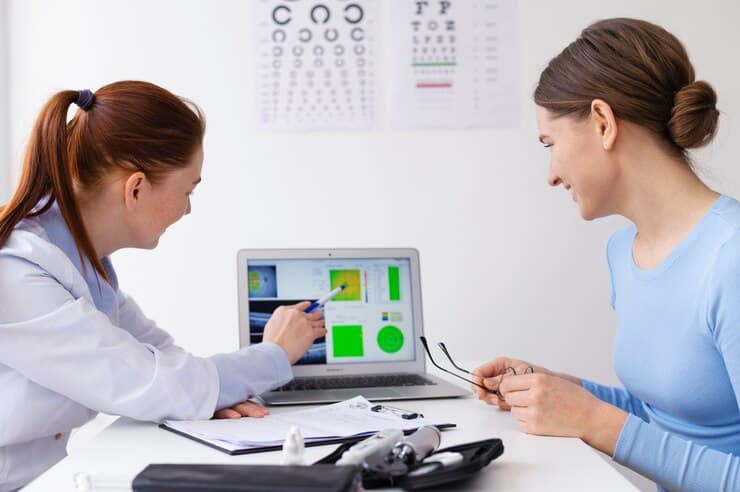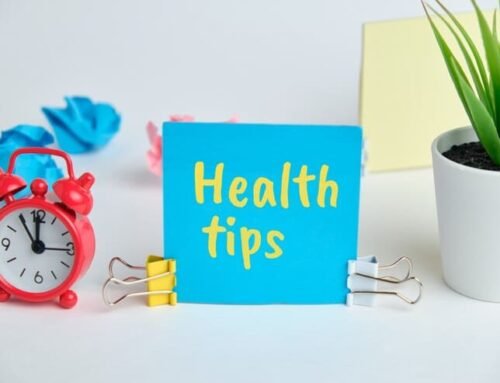Having regular health check-ups helps us stay healthy. They let us check for diseases early, keep an eye on our health, and cut down the chance of getting sick. By going for check-ups, we can catch health problems before they get serious. This makes treatments work better and helps us stay healthier.
Regular health check-ups are key for preventive healthcare. They let doctors spot warning signs and risks early. This means we can do things to keep healthy before we get sick. It’s a way for us to stay in control of our health.
Key Takeaways: Regular Health Check-ups
- Regular health check-ups are essential for maintaining a healthy life and promoting a proactive approach to healthcare.
- They play a vital role in the early detection of diseases, enabling timely interventions and improved treatment outcomes.
- Comprehensive check-ups can identify potential health issues before they become problematic, allowing for preventive measures.
- Regular check-ups facilitate the ongoing monitoring of an individual’s overall health, reducing the risk of complications.
- Preventive healthcare is a key benefit of regular health check-ups, as they enable the detection of warning signs and potential risk factors.
Introduction to Regular Health Check-ups
Regular health check-ups are meetings with your doctor when you’re not feeling sick. They are also called periodic health evaluations or wellness visits. These visits check your overall health status and look for any risk factors.
Definition and Overview
Regular health check-ups are a key part of staying healthy. They help find problems early. This way, you can take care of yourself better.
Staying ahead of health concerns is important. By getting check-ups, you can help prevent bigger issues. These check-ups are all about being smart and taking charge of your health.
The Changing Healthcare Landscape
Over the past years, people have started focusing more on staying well. They are choosing preventive care services to keep healthy. This shows how important preventive medicine has become. And, it’s known regular check-ups help your health for the long haul.
Who Needs Regular Health Check-ups?

Everyone should get regular health check-ups, no matter their age. The details, like how often and what to check, depend on age, sex, and health history. Working-age adults, usually 30 to 60, might need more check-ups. This helps spot and deal with diseases linked to lifestyle. But really, everyone needs check-ups, from kids to seniors, to stay healthy and catch problems early.
Working-Age Adults
After 30, many people find they’re busier and under more stress. This can affect their health in different ways. That’s why check-ups are key for working-age adults. They help find and manage issues like high blood pressure, high cholesterol, and diabetes. Staying ahead with preventive care helps these adults better look after their health. It’s about making smart choices for a strong body and mind.
All Age Groups
The focus and how often you get health check-ups change as you grow older. But the need for routine check-ups doesn’t. Check-ups are vital, from the time you’re a child to your older years. They let doctors track your health growth, catch problems early, and suggest steps to prevent more serious health issues. A wholistic approach to healthcare for all ages helps everyone live healthier. It ensures that problems are found early and managed well.
Key Benefits of Regular Health Check-ups

Regular health check-ups have many pros. They help spot diseases early. They also let us put in place preventive healthcare measures. And we can keep track of an individual’s overall health.
Healthcare providers are key. They can find warning signs and risk factors early. This allows for quick help and good health strategies.
Early Disease Detection
One big plus of regular check-ups is finding diseases early. Doctors can see if something’s off, even without symptoms. This can help start treatment early and avoid big problems. It makes getting better much more likely.
Preventive Healthcare
Check-ups also help with preventive healthcare. Doctors suggest tests and tell people how to live healthier. This proactive approach helps people stay well. It lowers the chance of getting serious illnesses.
Monitoring Overall Health
Keep watching a person’s health is very important too. Doctors follow their physical and mental health. They look for any changes and can adjust treatments or advice. This helps manage long-term health problems better.
Prevention and Early Detection
Getting regular health check-ups is key for spotting health issues early and stopping them from getting worse. Doctors look for signs like high blood pressure, too much cholesterol, or odd blood sugar levels. If they find any of these, they help you come up with a plan to deal with them. This can include making lifestyle changes and specific actions to keep these problems from getting any worse.
Identifying Warning Signs
By seeing a doctor often, you can catch signs of problems before they really start. They might notice things like your blood pressure going up or your cholesterol being off. These could be signs that you might get heart disease, diabetes, or cancer. Finding these signs early lets you and your doctor set up ways to make sure you stay as healthy as possible.
Preventing Disease Progression
If signs of a health problem are found early, you can work to prevent it from getting worse. Making changes like eating better, moving more, or quitting smoking can really help. By doing these things, you lower your chances of more serious health issues down the road.
Reducing Healthcare Costs

Regular health check-ups are key to lowering healthcare costs long term. They find issues early. This helps avoid big medical costs later. It’s better to catch problems before they get worse.
Getting checked often means you can fight health risks early. You won’t need as many big treatments. This saves money and keeps you healthier. It makes a big difference in your life and how much you spend on healthcare over time.
Not just that, but check-ups also mean you can catch diseases early. You can then manage them in cheaper ways. This lets you stay in control of your health and your wallet.
| Preventive Care Measure | Cost Savings |
|---|---|
| Annual Wellness Exam | $2,000 – $3,000 per person |
| Colorectal Cancer Screening | $10,000 – $15,000 per person |
| Breast Cancer Screening | $8,000 – $12,000 per person |
| Diabetes Screening and Management | $4,000 – $7,000 per person |
Regular Health Check-ups

Screening for Cancer
At your regular health check-ups, doctors will do cancer screening tests. These tests find any tiny abnormal changes or cells that may lead to cancer. They can spot cancers like colorectal, skin, breast, cervical, testicular, and prostate cancer. Finding cancer early through these tests is key. It can lead to better treatments and a higher chance of beating cancer.
Recommended Screening Tests
Your healthcare team will advise on the right appropriate cancer screening tests for you. This is based on your age, whether you are a man or a woman, and your health past. For instance, women might need mammograms for breast cancer, while men might need blood tests (PSA tests) for prostate cancer. Getting these tests regularly helps find any cancer early. It allows for quick steps to prevent it or to treat it better. This way, you can stay healthy and lower your cancer risk.
| Cancer Type | Recommended Screening Test | Frequency |
|---|---|---|
| Breast Cancer | Mammogram | Annual screening for women ages 40-74 |
| Cervical Cancer | Pap Smear | Every 3 years for women ages 21-65 |
| Colorectal Cancer | Colonoscopy | Every 10 years for adults ages 45-75 |
| Prostate Cancer | Prostate-Specific Antigen (PSA) Test | Annual screening for men ages 55-69 |
Optimizing Treatment Outcomes

Getting regular health check-ups is key. They help find health problems early. Also, they’re important in making treatments work better. Doctors can find and treat other health issues like bad lifestyle habits early. These can include drinking too much, smoking, or eating poorly. By dealing with these issues, doctors can lower the chance of problems and help treatments work their best.
Addressing Comorbidities
Some people have more than one health problem. These can make treating and recovering harder. Regular check-ups let doctors pick up on these extra issues early. Then, they can make a plan to tackle all the problems at once. With this broad approach, people have a better chance of getting well soon.
Lifestyle Factors
Check-ups also check your lifestyle. They help spot choices that might be hurting your health. Doctors can help you make better daily decisions. This could be eating better, moving more, or dropping bad habits. Making these changes can help a lot during treatment. It can make your recovery smoother and improve your health for the long haul.
Promoting Longevity

Health check-ups can help us live longer by spotting health issues early. They let healthcare providers help us get ahead of chronic diseases like heart issues, diabetes, and cancer. By offering full check-ups, they guide us to take control and avoid worsening these health problems.
Chronic Disease Management
With regular visits, doctors notice any potential health risks. They set up plans to help us manage chronic illnesses better. This includes keeping an eye on treatments and lifestyle choices that can affect our health.
This care really makes a difference in how well we do and in living a long life.
Preventive Measures
Getting regular check-ups lets us follow preventive health measures. These help us live longer and healthier. Such measures involve health screenings, getting vaccines when we need to, and adopting good lifestyle habits.
Being proactive about our health can decrease the chances of serious illnesses. It means we can enjoy life more as we get older.
Staying Updated on Medical Advancements

Getting regular check-ups is key to knowing about the newest medical advancements and healthcare technologies. It also lets you learn about innovative solutions that can help you stay healthy. Doctors and nurses are vital in sharing this information, helping us become more involved in our health monitoring.
New Technologies and Treatments
At check-ups, you might find out about the newest diagnostic tools and therapeutic options. You’ll learn how these advancements can better detect, manage, and treat health problems. This can push you to welcome new methods of keeping track of your own health and finding tailored care.
Wearable Health Monitoring Devices
Wearable health monitoring devices are a game-changer in health tech. Things like smartwatches and fitness trackers help you keep an eye on your health signs and activity. They encourage a more hands-on approach to managing your health. Doctors can show you how to make the most of these devices for your well-being.
Also Read : 10 Simple Strategies To Improve Your Mental Health & Wellbeing
Conclusion
Regular health check-ups are very important. They help us stay healthy and catch diseases early. They are key in keeping us well and improving our health.
Getting comprehensive check-ups means finding issues before they become big problems. It saves money and helps us live longer. It also improves how treatments work for us.
Healthcare keeps changing, with new things coming all the time. Knowing about these new options and using new tech make us stronger. Investing time and effort in our health is a path to a better life.
This happens by being proactive in looking after our health. If we take these steps, we can feel better and enjoy life more. It’s all about staying well and full of energy.
FAQs
What are the benefits of regular health check-ups?
Regular health check-ups are very important. They help spot diseases early and lower the risk of getting sick. For people, they mean better treatment and care.
These check-ups also let doctors keep an eye on your health over time. They can find small problems before they become big ones. This makes treatment easier and more effective.
Who should undergo regular health check-ups?
Everyone, no matter their age, can benefit from regular check-ups. How often and what the check-ups focus on change as we grow older. People between 30 and 60 years old, who might face more diseases from their lifestyle, should pay extra attention.
Your gender and what health issues run in your family can also play a part. These factors help decide what check-ups are best for you.
How do regular health check-ups help with early disease detection?
These check-ups are key to finding diseases early. Doctors can spot signs like high blood pressure and abnormal blood sugar.
Timely check-ups give you a chance to make lifestyle changes. These changes can slow down or stop diseases from getting worse.
How can regular health check-ups help reduce healthcare costs?
Getting check-ups regularly is smart for your wallet, too. It catches small issues before they become big, expensive ones.
By working on your health early on, you might not need costly treatments later. This can save you money in the long run.
What types of cancer screening tests are typically included in regular health check-ups?
Regular check-ups often check for cancer. This includes tests for colon, skin, breast, cervical, testicular, and prostate cancer.
These tests can find cancer early, sometimes before you feel sick. Finding cancer soon means you have a better chance of treating and beating it.
How do regular health check-ups contribute to optimizing treatment outcomes?
These check-ups are not just about finding health issues. They’re also about making sure treatments work well.
Doctors look at your overall health to see how best to treat you. This includes fixing bad habits that might make treating you harder.
How can regular health check-ups contribute to increased life expectancy?
Going for check-ups can help you live longer. Doctors find and treat chronic diseases like heart conditions, diabetes, and cancer early.
They also tell you how to stay healthy long-term. This includes smart choices and using new health information and tools.
How can regular health check-ups help individuals stay informed about the latest medical advancements?
Check-ups are a chance to learn about new health tech and treatments. Doctors share information about the newest ways to stay healthy.
Knowing this stuff helps you take better care of yourself. It also makes it easier to use new health tech and advice to stay well.
Source Links
- https://mypvhc.com/importance-regular-check-ups/
- https://www.nanavatimaxhospital.org/blogs/importance-of-regular-health-check-ups
- https://www.betterhealth.vic.gov.au/health/servicesandsupport/regular-health-checks








Leave A Comment